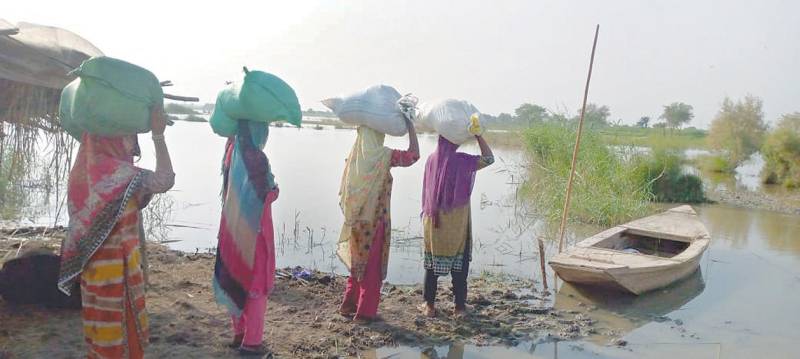ISLAMABAD - An emergency resolution will be presented in the context of the devastating flood in Pakistan in the next meeting of the Inter-Parliamentary Union in Rwanda.
This resolution will present a forceful demand that developed countries must compensate for irreparable socio-economic losses due to climate change in developing countries, Speaker of the National Assembly Raja Pervaiz Ashraf expressed these views while addressing the inaugural session of 3rd IPU Seminar of Parliaments of Asia –Pacific to achieve Sustainable Development Goals at Parliament House. In a bid to highlight the unprecedented havoc caused by recent devastating flood, the successful organization of IPU seminar is a remarkable effort of National Assembly of Pakistan, he said. Addressing the seminar, the President of IPU announced to support Pakistan at all international forums. In the recent floods, Pakistan’s economy suffered a colossal loss of 18 billion dollars and more than 1500 people lost their lives. In addition to this, health, education, communication and electricity systems were badly affected.
Speaker Raja Pervaiz Ashraf raised a question to the international community that who would compensate irretrievable losses caused by climate change as Pakistan and other developing countries had less than 1 percent share in environmental degradation, but 90 percent of the shattering consequences are being faced by these countries.
The developed countries of the world, responsible for due to which the environmental damage, must remember that the building of their development is standing on the destruction of the developing countries. This injustice cannot be tolerated. International equality and equitable sharing of the fruits of development are essential for international peace.
Special Assistant to Prime Minister on Youth Affairs Ms. Shaza Fatima, while moderating the session on promoting equal education and decent work during the third IPU Asia-Pacific Region seminar on Achieving SDG Goals, apprised that 55 percent of the global youth is living in Asia-Pacific region among NEET youth in the region three-quarters are females. She further said that in 2019 around 13.8 percent of the youth in the region was unemployed compared to the global average of 13.6. She said that one out of every four young employees was earning under 3.20$ per day and forced to work under extreme poverty. Ms. Shame Fatima also apprised the session about increasing trend of Public Private Partnership and Entrepreneurship in Pakistan.
She said that natural disasters like recent floods and Covid-19 outbreak had contributed to worsen the situation in Pakistan. She said that there were multiple factors responsible for prevailing unemployment. Most important a disconnect between skillset and labour market.
She was followed by Zahid Akram Durrani Deputy Speaker National Assembly who further enlightened the session that Goal 4 of the SDGS 2030 demanded for promotion of lifelong learning for everyone along with inclusive and equitable education for everyone. “We parliamentarians were providing with roadmap to work on promoting quality education and provision of decent work opportunities as per international development agenda,” he said.
Senior Programme Officer, International Labor Organization Ms. Rabia Razzaq also addressed the session. She emphasised upon equal provision of internet access to rural areas so that healthy competition in the market may be promoted.
Federal Minister for Poverty Alleviation and Social Safety, Shazia Marri resolved to achieve SDGs target to eradicate hunger and poverty while ensuring safe and nutritious food by 2030 and end all form of malnutrition by 2035 in the country.
While addressing the sideline session on “Ending Hunger and Malnutrition” of the 3rd Inter-Parliamentary Union Regional Seminar on Achieving SDGs, Federal Minister Shazia Marri said that COVID-19 and the recent floods have pushed the people in food insecurity.
The sideline session was aimed to discuss ways to successfully address population needs through the promotion of adequate policies and laws across sectors, including health, agriculture, education and gender equality, and to implement the SDGs by maximizing the available domestic resources for nutrition.
During his address, she said that Pakistan was paying a huge price for carbon emission by other countries. Because of the climate change, the recent rains had resulted in catastrophic floods, resulting in 33 million displaced citizens and over 1300 deaths. Moreover, 65% of the major crops, including cotton, dates, onion and rice, were destroyed, resulting in increased risk of malnutrition. She feared that agriculture production would fall in the years to come due to severe droughts.
Silvia Kaufmann from Scaling Up Nutrition (SUN) Movement underlined that better nutritional intake couls help children to perform better in education, which ultimately help them to generate better income. She said that by investing in nutrition, a country could fight inequality and injustice.
She said that 1 in 5 children were suffering from stunted growth, while in South Asia women were more food insecure than men.
Kraisid Tontisirin, Member of the Bureau of the IPU Standing Committee on Sustainable Development and MP of Thailand, expressed solidarity with the Pakistani people suffering due to the floods.






